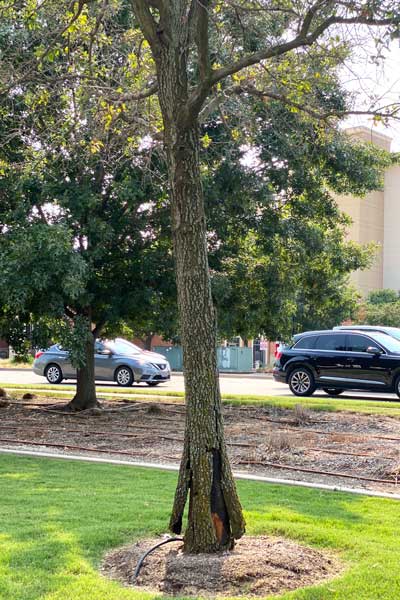Question of the Week: September 16, 2021
“Why is all the bark coming off my tree? Will it survive?”
This question has come up almost everywhere I’ve turned all summer long. This tree is in the drive-through lane of one of our grandson’s favorite hamburger restaurants. I’ve been watching it all year.

Under normal circumstances, when a live oak sheds its old bark it is done in small chunks, often unnoticeable as they fall to the ground and become a part of the soil’s organic matter component.
However, when an extreme freeze event like the February cold spell comes and stays for several days, a process known as “radial shake” can happen. The bark and internal wood of the trunk are frozen and develop deep cracks.
As months pass, the bark separates and begins to fall in large sheets. Bare wood of the trunk is exposed in the process, and because the phloem and cambium layers are both lost with the bark, the tree is pretty much doomed.
The tree in my photo has less than 20 percent of its normal leaf count, and in a few months even those will be gone. It needs to be removed immediately. It will not be able to recover from damage of this catastrophic nature.
This has been a statewide problem for live oaks. Fortunately it has only impacted a small percentage of our state’s live oaks, but for those that were hurt, the damage is remarkable.
I’ve also received questions through my various newspaper columns and my Saturday statewide radio program about Shumard red oaks, water oaks and other species of oaks. Frankly, in my 50-plus-year career in Texas horticulture, I’ve never seen anything quite like it.
Your best bet for oaks and any other trees you feel might be in jeopardy of loss to last winter’s cold, your best source of help would be an ISA certified arborist (International Society of Arboriculture). It’s always best to turn to the pros.
